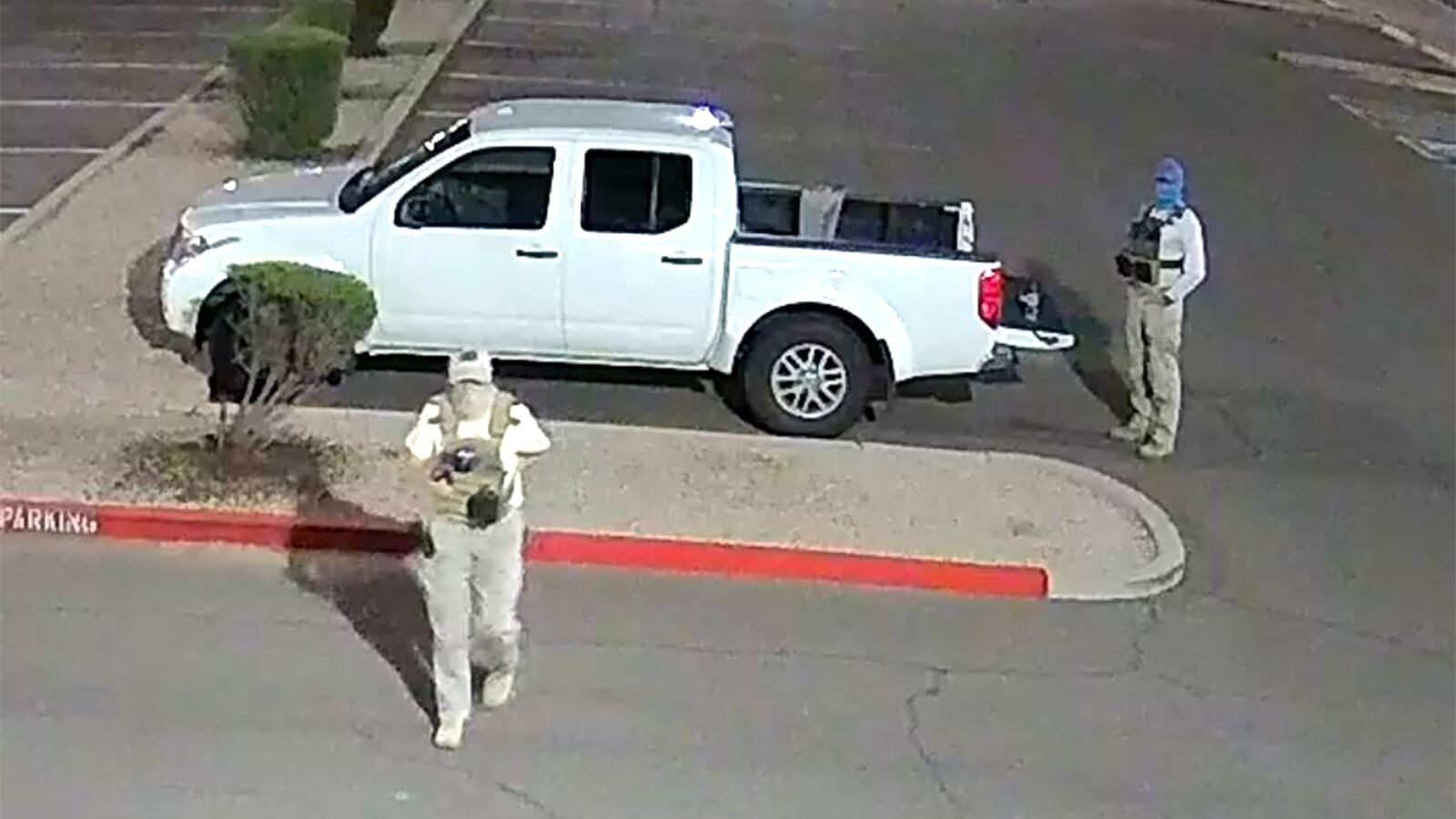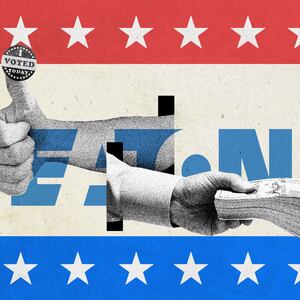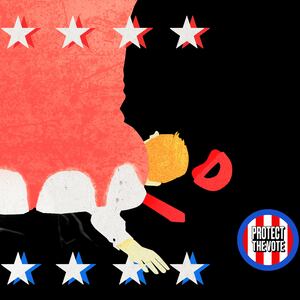SCOTTSDALE, Arizona—On a postcard-perfect fall day in the Phoenix suburbs, Steven Martin arrived at an early voting location not to cast his own ballot, but to do something else: see if anyone else was there to intimidate someone else casting theirs.
“I was going to film some filmers,” said Martin, a retiree from Scottsdale.
Not long after, Brian Curry, a semi-retired Phoenix man who delivers with GrubHub, stopped by to hand out Chips Ahoy cookies to poll volunteers and keep an eye on voters. “I think our democracy is in peril,” he said. “I’ve never thought that before.”
There wasn’t much to film, or keep an eye on, during this quiet Tuesday afternoon at Indian School Park, save for voters trickling in and out of the poll center and volunteers chatting outside. The same was almost certainly true for dozens of other voting locations throughout Maricopa County, home to 2.5 million Arizona voters, where the vast majority of early votes in a busy election season are being cast without incident.
But a string of shocking scenes here have, for many, shattered the image of democracy humming along as intended—and prompted regular citizens like Martin and Curry to show up at seemingly sleepy polling places out of concern that the integrity of the vote is at serious risk.
On the night of Oct. 21, two masked, armed men in tactical gear were seen camping out at a 24-hour ballot drop off box in the suburb of Mesa. The prior week, outside Maricopa County elections headquarters in downtown Phoenix, a voter was reportedly filmed by someone accusing them of being a “ballot mule,” and camo-clad people were allegedly taking photos of voters dropping off ballots.
After the 2020 election, Arizona was the wellspring of many of the election conspiracy theories that continue to grip the Republican Party today. Now, convinced that their lack of vigilance then allowed Democrats to steal the election from Donald Trump, Big Lie believers are taking new measures to act on these baseless conspiracies and intimidate voters from exercising their rights.
Clean Elections USA, an outfit led by fringe conspiracists, have called for volunteers to show up at ballot drop boxes around the state. Fittingly, their activities have gotten tacit approval from statewide GOP candidates, such as Mark Finchem, the nominee for secretary of state who rose to prominence by fomenting these claims.
So far, those armies of conspiracists have not materialized, and voter protection advocates emphasize that instances of intimidation have been limited so far.
They have, however, succeeded in putting many Arizona voters on edge.
Gay Willits, an interior designer who stopped by the Scottsdale early voting center to cast her ballot, approached her once-mundane civic duty with dark humor: she laughed with a fellow voter about encountering armed vigilantes at the polling place.
But she told The Daily Beast that the reports prompted her to drop off her ballot at a staffed early voting center rather than at a ballot box, where she feared someone might take a photo of her license plate or follow her.
Such is the sad reality of voting in 2022 in a pivotal state that will help decide the national balance of power—and determine whether those who helped to stoke election conspiracies will win the authority to run this state. Many worry that national and local media and politicians’ focus on the threats might make voters too scared or turned off to participate and influence the outcome of this election.
“The more we talk about ‘unprecedented’ voter intimidation, the more we’re blowing it out of proportion,” said Alex Gulotta, an attorney and Arizona director for All Voting Is Local, a voting rights nonprofit. “They want it to be scary, they want to create an impression that it's scary to go vote.”
Many elections officials and advocates in Arizona are optimistic that voters will overwhelmingly be free to exercise their rights—and that retirees and off-duty gig workers won’t need to come out and patrol their local polling places in order to ensure that happens.
It’s unclear how many such people have taken it upon themselves to watch the watchers, but it’s “not surprising” that they have, said Taylor Moss, the Election Protection Director at the Arizona Democracy Resource Center.
Moss’ organization is just one of several important forces countering this wave of conspiracy-fueled voter intimidation. They have trained 200 volunteers statewide to monitor the polls, along with 80 “defenders,” mobile volunteers who are trained to respond to reported threats at specific locations and peacefully de-escalate.
“Whatever folks are hearing, it’s scary,” Moss said. “We love that people are wanting to help, but we call it de-escalation because things can escalate quickly. We want everyone to be safe. From our point of view, if that’s something folks are interested in, we prefer they get trained, just because we want to make sure everyone’s safe and nothing happens that can be avoided.”
The situation at the ballot drop box in Mesa has garnered most of the local and national media attention, and most of the concern from organizers like Moss. Located in a county government parking lot, it is one of two 24-hour ballot drop boxes open in Maricopa County. Conspiracy peddlers like Dinesh D’Souza, director of the film “2,000 Mules,” have spread the baseless idea that such drop boxes are uniquely vulnerable to fraudsters who stuff them with fake votes.
There are a multitude of reasons why those theories and ensuing efforts to monitor the boxes are profoundly silly, as Maricopa County Recorder Steven Richer has explained. A ballot drop box, for one, is basically the same as a mailbox when it comes to delivering early ballots. What’s more, there are a number of redundancies baked into the voting tabulation process to prevent multiple votes from one person being counted.
Still, Republican candidates for office in Arizona have sought favor with their base by amplifying these debunked theories and encouraging efforts to camp out at drop boxes.
“We’re an open carry state, people can watch those boxes, because the county sure as hell isn't,” Finchem said in a recent media interview. (The county has, in fact, put the drop boxes under 24-hour surveillance.)
Blake Masters, the Republican challenging Sen. Mark Kelly (D-AZ), encouraged his supporters not to intimidate voters but to “get your video camera out and record to make sure people aren’t ballot harvesting.” Of course, this behavior is described by voter protection advocates as textbook voter intimidation.
In response to their comments, Richer, a Republican, said candidates should instead be encouraging their supporters to become official poll volunteers and formal observers at county headquarters and at voting locations statewide.
“It’s a much more fruitful way to actually get involved, and it’s actually meaningful,” Richer told The Daily Beast, adding that calls to monitor the ballot boxes are “a little bit of meat to throw to people who have been fed this ‘2,000 Mules’ nonsense. But it’s meaningless, and it’s a waste of time to go out there.”
Still, the drop box in Mesa has continued to attract those seeking to scare away voters—and for those working to foment a safe environment for voters.
“We’ve deployed people throughout the early voting period to that dropbox, just to keep checking on it,” said Moss. “We know the evenings, once it gets dark, is when things have been happening there.” She said there have been no confrontations but that their volunteers go in groups so as to protect themselves.
County-wide, there have so far been nine formal complaints of voter intimidation referred to local and federal law enforcement, Richer said. He argued that since the Mesa videos went viral, the overall environment in Maricopa County has “gone down in temperature.”
Voter protection advocates told The Daily Beast that they feel the intimidation efforts could backfire and actually spur even greater participation.
Moss said 2022 is an unusual environment because conspiracy theories have “really permeated various communities, so we see these folks who are willing to be bad actors in this situation.”
“But I do believe that, overwhelmingly, voters are still ready to get out there, and want to say something with their votes,” she said.
Indeed, on a Sunday afternoon, the parking lot at the Mesa ballot drop box was empty. In the span of just 20 minutes, eight people drove by to drop off their ballots.
“These people just want attention, and they’re getting attention for their bad behavior,” Gulotta said of the people who have camped out with their weapons at the ballot box. “In fact, they’re not winning. People are voting, and they’re going to keep voting.”









